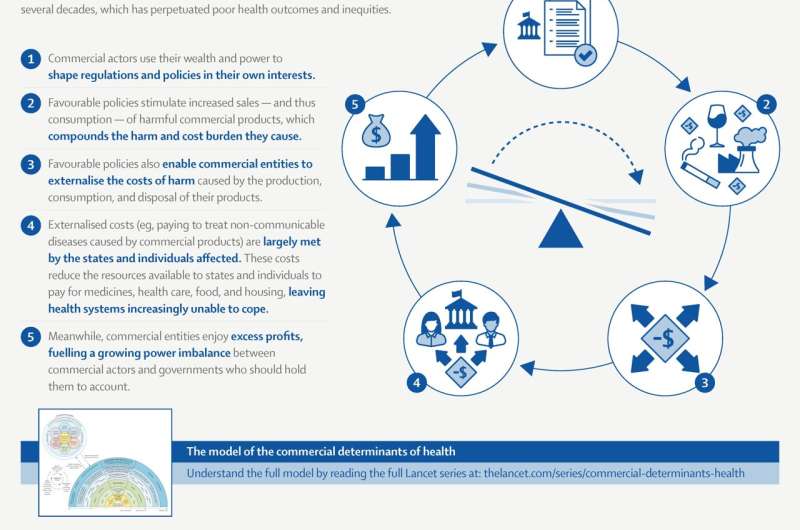A new Series published in The Lancet describes how, although commercial entities can contribute positively to health and society, the products and practices of some commercial actors are responsible for escalating rates of avoidable ill health, planetary damage, and social and health inequity. Authors make key recommendations to ensure that contemporary capitalism is compatible with good population health.
The industries that produce just four harmful products—tobacco, alcohol, unhealthy food, and fossil fuels—account for at least a third of global deaths, illustrating the scale and huge economic cost of the problem.
Professor Rob Moodie, Series Lead and Professor of Public Health Melbourne School of Population and Global Health, University of Melbourne, says, “We all want to be part of a society that’s safe, happy and healthy but this will only happen when governments make the health of people and the planet a higher priority than profit. This series isn’t anti-business, it’s pro-health. It’s important that we acknowledge that many businesses play vital roles in society, but we also need to recognize the practices and products of some are making people and the environment sick.”
He adds, “With the rise of non-communicable diseases such as heart disease, cancer and diabetes and the escalating climate crisis, urgent action is needed to address the way businesses contribute to these problems, and in particular, industries that sell harmful products.”
Outlining a cycle of how commercial actors can harm health, they describe the following steps:
- Commercial actors use their wealth and power to shape regulations and policies in their own interests.
- Favorable policies stimulate increased sales—and thus consumption—of harmful commercial products, which compounds the harm and cost burden they cause.
- Favorable policies also enable commercial entities to externalize the costs of harm caused by the production, consumption, and disposal of their products.
- Externalized costs (eg, paying to treat non-communicable diseases caused by commercial products) are largely met by the states and individuals affected. These costs reduce the resources available to states and individuals to pay for medicines, health care, food, and housing, leaving health systems increasingly unable to cope.
- Meanwhile, commercial entities enjoy excess profits, fueling a growing power imbalance between commercial actors and governments who should hold them to account.
The authors argue that a cycle of behavior by commercial actors and policy makers has insidiously tipped the balance of power increasingly in favor of commercial profits over several decades, which has perpetuated poor health outcomes and inequities. To restore this balance and ensure that contemporary capitalism is compatible with good population health, the authors make key recommendations.
Among these, they call on governments to legislate higher standards for marketing of harmful products, including honest product labeling and protections for people from predatory marketing tactics including via social media. Additionally, they ask businesses to commit to ending lobbying against pro-health policies, including using third parties such as fake grassroots (astroturf) organizations and think tanks to push political agendas. Furthermore, authors congratulate commercial actors and investors who are increasingly adopting alternative financing models that create social value, and promote positive health, social and sustainability outcomes and encourage others to follow this example.
More information:
The Lancet Commercial Determinants of Health Series, The Lancet (2023). www.thelancet.com/series/comme … -determinants-health
Citation:
Health experts call for bold action to prioritize health over profit (2023, March 23)
retrieved 24 March 2023
from https://medicalxpress.com/news/2023-03-health-experts-bold-action-prioritize.html
This document is subject to copyright. Apart from any fair dealing for the purpose of private study or research, no
part may be reproduced without the written permission. The content is provided for information purposes only.


